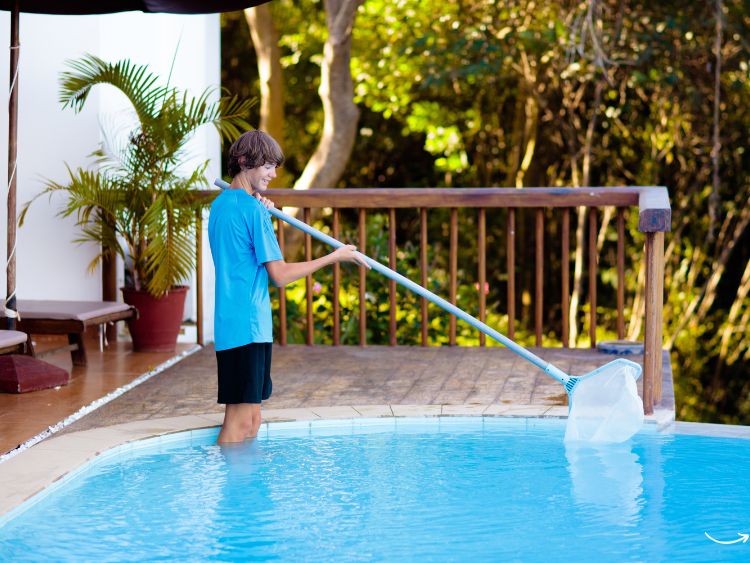Maintaining a saltwater pool might seem like a daunting task, but with the right knowledge and a bit of routine care, you’ll find it’s as easy as pie. This guide will walk you through the ins and outs of saltwater pool maintenance, ensuring your aquatic haven stays sparkling clean and ready for a dip at any time.
So, you’ve opted for a saltwater pool? Great choice! Saltwater pools are known for their lower maintenance costs, softer water, and gentler impact on skin and eyes. However, like any pool, they still require regular upkeep to remain in top condition. Let’s dive into the essential steps for maintaining your saltwater pool, ensuring it stays a beautiful and enjoyable part of your home.
Understanding the Basics of Saltwater Pools
What is a Saltwater Pool?
A saltwater pool uses a salt chlorinator to produce chlorine from salt added to the water. This system provides a more consistent chlorine level, reducing the need for chemical additives and making the water gentler on your skin and eyes.
Benefits of Saltwater Pools
- Gentle on Skin and Eyes: Unlike traditional chlorine pools, saltwater pools have lower chlorine levels, which means less irritation for swimmers.
- Lower Maintenance Costs: Once established, maintaining a saltwater pool can be more cost-effective due to reduced chemical purchases.
- Softer Water: Saltwater pools feel silkier and more pleasant to swim in.
Essential Saltwater Pool Maintenance Tips
1. Regularly Test the Water
Testing your pool water is crucial. Ideally, you should test the water at least once a week to ensure the chemical levels are balanced.
- Chlorine Levels: Keep the chlorine level between 1-3 ppm.
- pH Levels: Aim for a pH level of 7.4-7.6.
- Salt Levels: Check that the salt level is between 2700-3400 ppm, depending on your chlorinator’s recommendations.
2. Clean the Salt Cell
The salt cell is the heart of your saltwater system. Over time, calcium and other minerals can build up on the cell plates, reducing efficiency. Clean the salt cell every 3-6 months to keep it functioning properly.
3. Monitor the Stabilizer (Cyanuric Acid)
Cyanuric acid helps protect chlorine from being degraded by sunlight. Maintain a stabilizer level of 70-80 ppm for optimal performance.
4. Check the Pump and Filter
Your pool’s pump and filter need regular checks to ensure they are working efficiently. Clean the filter and check the pump’s operation every week.
5. Balance Calcium Hardness
Calcium hardness affects the water’s feel and can cause scaling if levels are too high. Maintain calcium hardness between 200-400 ppm.
6. Shock the Pool
Even saltwater pools need an occasional shock treatment to keep the water clear and free from contaminants. Shock your pool every 1-2 weeks, especially after heavy use or rainstorms.
7. Brush and Vacuum
Regularly brushing the pool walls and vacuuming the floor helps prevent algae growth and keeps the water clear. Aim to do this at least once a week.
Common Saltwater Pool Maintenance Issues and Solutions
Algae Growth
Algae can be a common issue in saltwater pools, especially in warm climates. Regularly brushing the pool, maintaining proper chlorine levels, and shocking the pool as needed can help prevent and control algae.
Cloudy Water
Cloudy water is often a sign of imbalanced chemicals. Regular testing and adjusting of chlorine, pH, and alkalinity levels can resolve this issue. Additionally, ensure your filter is clean and functioning correctly.
Scale Build-Up
Scale build-up is caused by high calcium levels and can appear as white, crusty deposits on the pool surface and equipment. Regular cleaning of the salt cell and maintaining proper calcium hardness levels can prevent this.
FAQs about Saltwater Pool Maintenance
How often should I add salt to my saltwater pool?
You typically need to add salt to your pool at the start of the season and occasionally throughout the season, depending on rainfall and water loss. Always follow the manufacturer’s recommendations for your specific chlorinator.
Can I use regular table salt for my saltwater pool?
No, it’s best to use pool-grade salt, which is pure and free from additives that could harm your pool or equipment.
Do saltwater pools need to be winterized?
Yes, like any pool, a saltwater pool needs to be properly winterized to protect it from freezing temperatures. This includes lowering the water level, adding winterizing chemicals, and covering the pool.
How do I know if my salt cell needs to be replaced?
If your chlorine levels are consistently low despite regular cleaning and maintenance, it might be time to replace the salt cell. Most cells last between 3-5 years.
Summary
Maintaining a saltwater pool involves regular testing, cleaning, and monitoring of chemical levels. By following these steps, you can ensure your pool remains a safe, enjoyable, and beautiful feature of your home. From testing the water to cleaning the salt cell, each task plays a crucial role in keeping your saltwater pool in top shape. Happy swimming!
Authoritative Links
- https://www.swimmingpool.com
- https://www.poolcareguy.com
- https://www.troublefreepool.com
- https://www.swimuniversity.com
By following this comprehensive guide, you can enjoy the many benefits of a saltwater pool while ensuring it stays clean and inviting all season long.
